We all know a loyal customer base is the bread and butter of a successful eCommerce store 🍞
Repeat customers spend 67% more than new ones. 16% of shoppers are prepared to drop more cash with brands they're loyal to. And according to Bain & Company, a loyal customer who shops with your brand ten times will refer seven people to your store.
Building a loyal customer base like that takes a lotta work.
But with B2C email marketing software, customer nurturing and product recommendations can be put on autopilot and turn your new customers into loyal champions of your brand.
In this piece, we will talk about why B2C email marketing software is such an important tool in an eCommerce toolkit and compare the 6 best platforms on the market in 2023.
Let's dive in.
What is B2C in email marketing?
Business-to-consumer email marketing, known as B2C email marketing, is when you send an email directly to a subscriber’s inbox advertising your products.
And it works. There are loads of ways to use email to connect with (and convert) B2C customers with welcome messages, abandoned cart reminders or product updates. In fact, according to Emarsys, 81% of SMBs use email as their primary acquisition channel, while 80% rely on it to retain customers.
With B2C email marketing software, your emails can hit customer inboxes at the right time with the right messages. And the best part? It does it on autopilot.
What should be considered when selecting a B2C email marketing software?
Before we jump into comparing the best B2C email marketing tools, here's what you should consider when investing in one 👇
- Usability: Is the software easy to use, and will it make you more productive? Can you automate manual tasks like follow-ups and send out customer emails that will convert?
- Reliability: Does it have solid deliverability rates, or will your emails get flagged as spam?
- Integrations: Does it integrate with the existing tech stack you use to run your eCommerce store?
- Law and compliance: Does it comply with your country's email/spam laws and regulations?
Now you know what the essentials of email marketing software for B2C are, here are the 6 best tools for B2C vendors to connect with customers 👇
The 6 best email marketing software for B2C
1. Sendlane
TL;DR 👇
⚡Best B2C integrations: BigCommerce, Shopify, WooCommerce, ClickBank,.
💰 Pricing: Plans start at $83/month for 5000 subscribers.
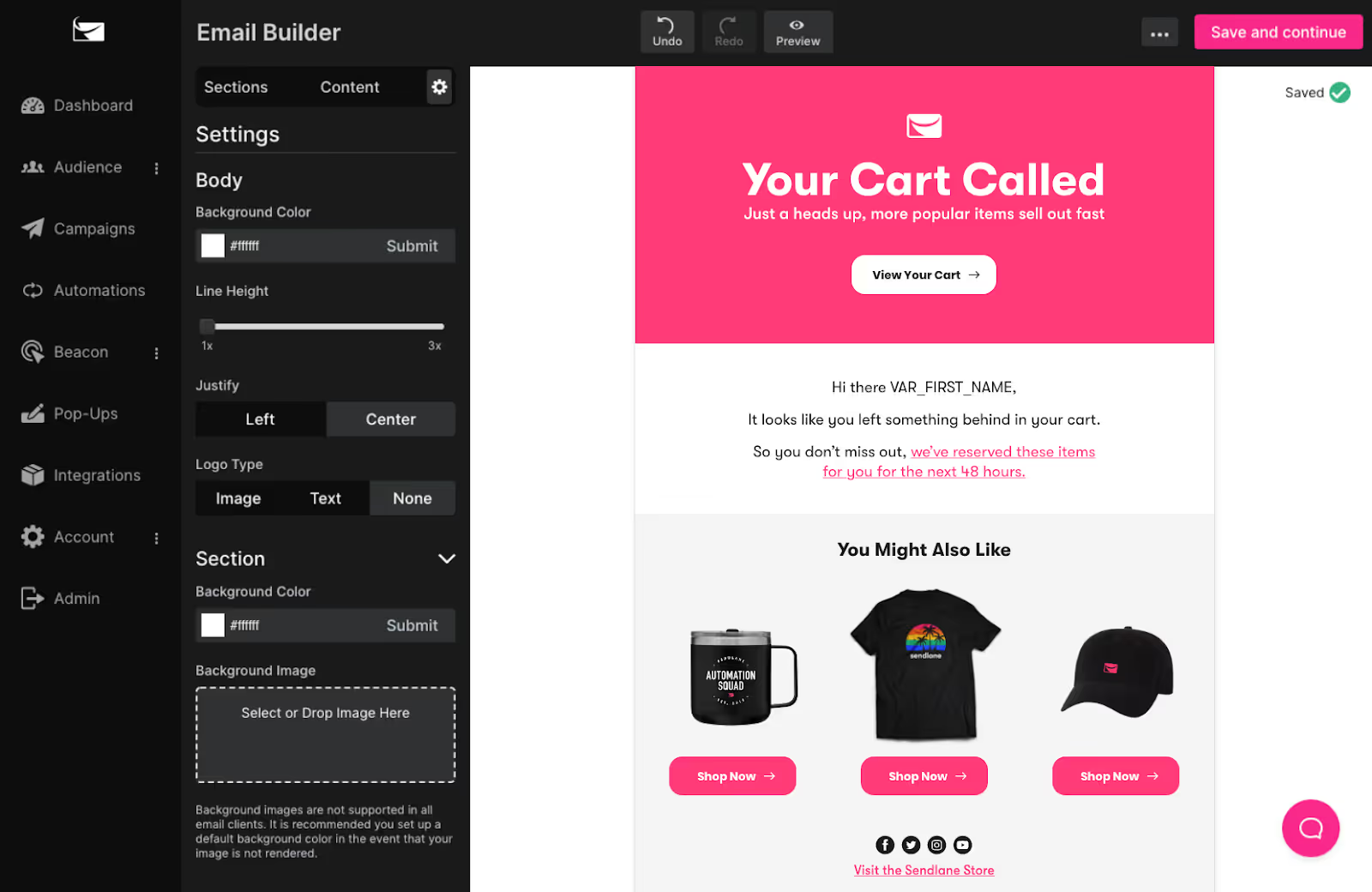
Sendlane is an email and SMS marketing software built for eCommerce vendors that want to send targeted, personalized messages to customers. Our tool is full of features for brands that want to go beyond basic customer emails and build a loyal customer base.
Let’s start with the one must-have of any B2C email marketing software: email automations.
With our email builder tool, you can create basic welcome email and cart abandonment sequences that are triggered based on customer behavior (i.e., when they sign up to your list). But our software takes this feature further thanks to advanced features like Multivariable Segmentation, Experiments - Multivariate Testing. Using these, you can target multiple site visitors and repeat customers based on purchases, email opens and clicks to send personalized messages that resonate.
We’ve also been working to make sure every sequence B2C vendors create is a successful one with our 50+ prebuilt Funnels. These eCommerce-proven funnels are built to welcome new customers, retarget browsers and abandoned carts, plus much more. All you need to do is plug your content!
Sendlane’s Best Features
✔️Built for B2C communications. Every plan includes 50+ Prebuilt email and SMS funnels, email templates, multivariable segmentation and advanced customer targeting
✔️The best customer support in the game, available 24/7/365 in 30 seconds or less (yup, even on holidays!)
✔️It’s super simple to use and create automations that convert customers
✔️Upfront real-time data analytics that track everything from open rates to ROI and conversions to paint an accurate picture of your customers
An example of Sendlane’s B2C email marketing software
Sendlane’s power starts with its segmentation and tagging tools.
Thanks to Sendlane’s deep-data integration, you can target customers with personalized content based on their behavior. For example, if they abandon a cart or bounce from your site before they make it to the checkout, you can still nurture them to come back. Just build a trigger to target recent website visitors. If they land on your site, Sendlane will automatically send them an email.
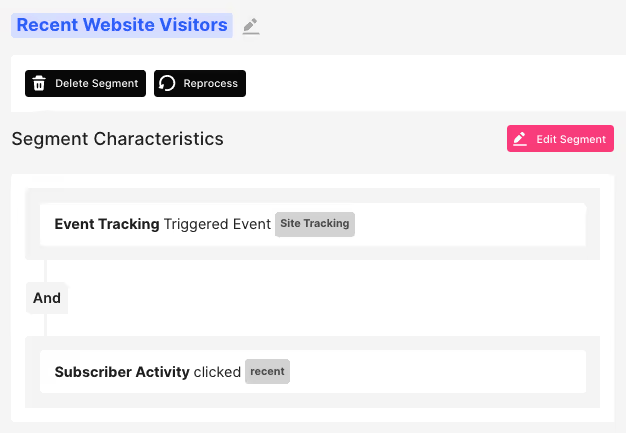
Thanks to real-time tracking, the email sent to your customer will be based on their behavior to include product recommendations and highlight items they were already looking at on your site or that compliment a recent purchase. Take a look at this prebuilt sequence:
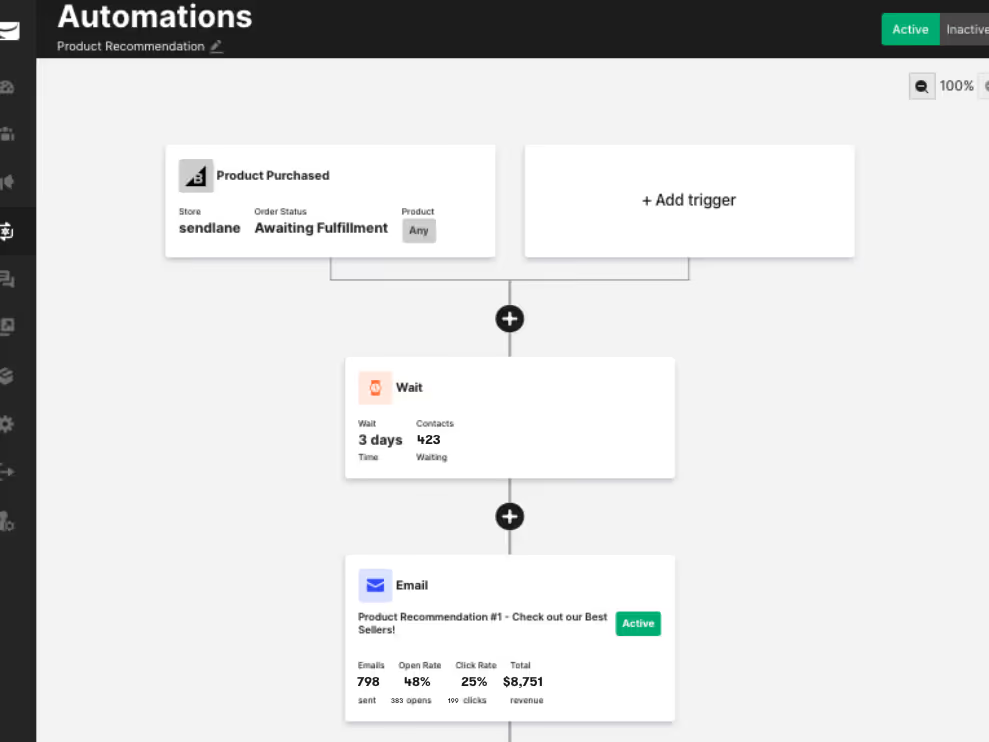
Sendlane detected a customer who was looking at a product, but they didn't make it to the checkout. Thanks to the automation, the customer will be reminded of their abandoned checkout and targeted with products they love.
Pricing
Unlike most B2C email software, Sendlane’s pricing keeps it simple.
You can access a 60-day free trial to take Sendlane for a test drive and make sure it's the right tool for you. After that, you’ll select the paid plan that works for your contact list.
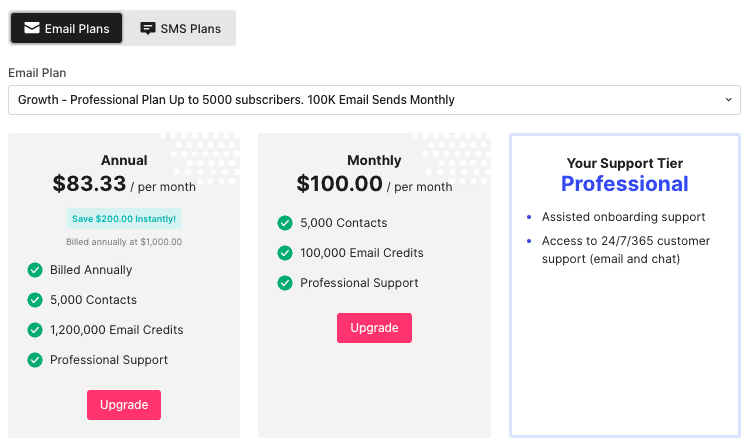
A huge bonus for Sendlane users is that you don’t need to switch plans to access features when your store scales. Vendors get access to every feature Sendlane offers regardless of your plan, and SMS can be added on no matter what pricing tier you choose.
Want to try Sendlane? Sign up here.
2. Drip
TL;DR 👇
⚡ Best B2C integrations: Shopify, Magento, Sleeknote, Facebook Custom Audiences, Stripe, Leadpages.
💰 Pricing: Plans start at $39/month.
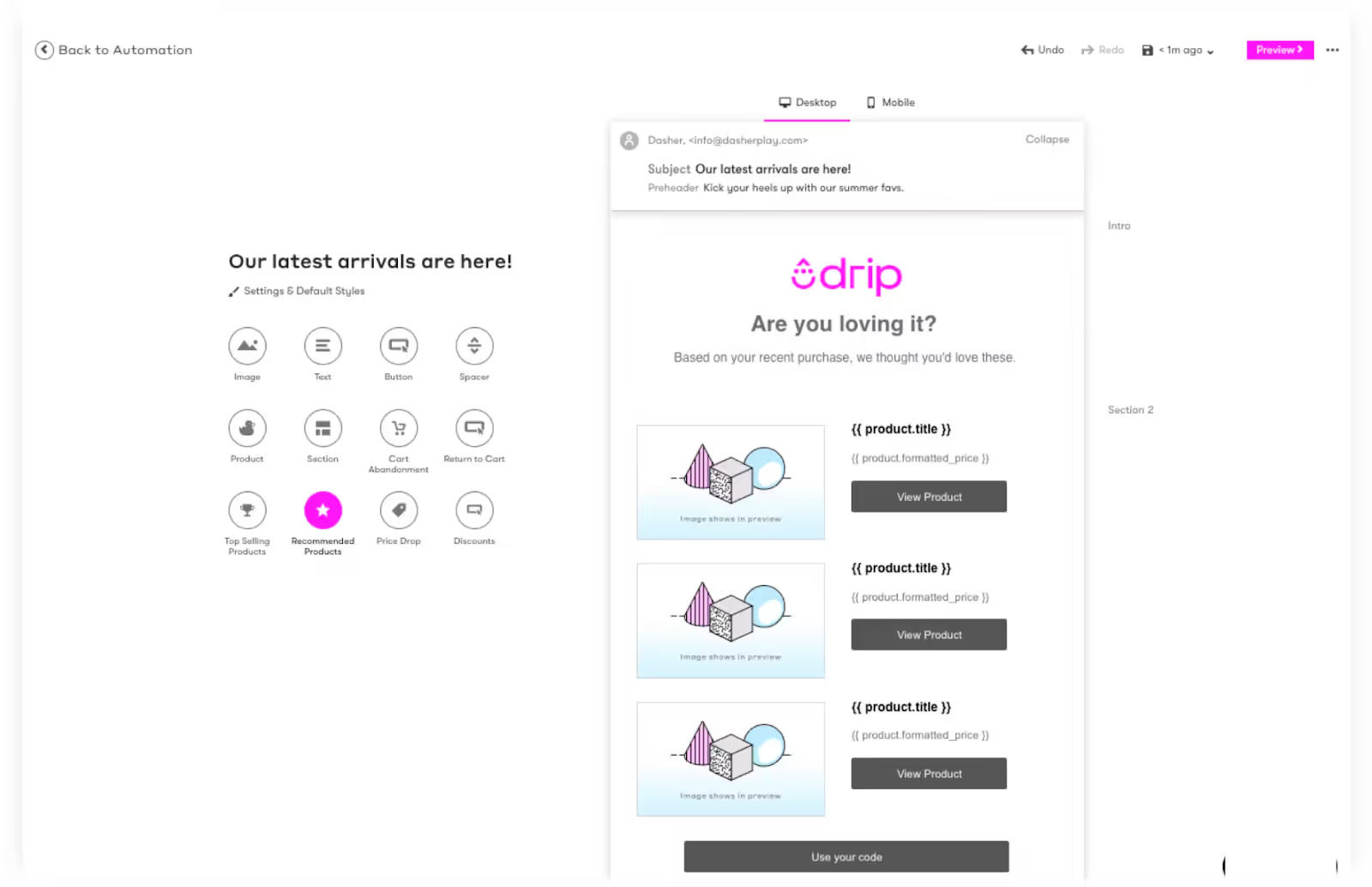
The next tool on our list is Drip, an eCommerce email software for brands who want to build loyalty using drip campaigns.
Drip campaigns, otherwise known as drip sequences, basically mean a subscriber is drip-fed a marketing campaign over several days based on their behavior (like clicking on a specific product or abandoning their cart). And while all of the tools on our list offer drip sequences, Drip’s advanced customizations and multichannel marketing features deserve a shoutout.
Once social channels like Instagram, TikTok and Facebook are plugged into Drip, it will populate ads and campaigns across a customer’s feed if they’ve shown interest in your products. A big draw for eCom brands who are using product images and influencer marketing to win shoppers over.
But if you’re choosing Drip purely because of its sequences, be aware the software doesn’t have a lot of prebuilt templates. It also doesn’t have a landing page builder, so you’ll have to pay for a separate tool unless you want customers to land on existing product pages (which isn’t great for seasonal campaigns like Christmas or BFCM).
Pros
✔️ Covers the basics like drip campaigns, multichannel marketing and customized workflows
✔️ Prebuilt forms and popups help drive email signups when customers land on your site
Cons
❌Some users say Drip lacks important integrations with eCommerce platforms
❌Surprisingly limited support—hard to get help at night or on weekends
💰Pricing
Drip offers a 14-day free trial with unlimited features, so you can really put the software through its paces. Once it's over, Drip's paid plans start at $39/month for 2,500 subscribers. However, B2C vendors with growing lists may find the tool's pricing a little steep (and restrictive). For example, lists with over 30,000 subscribers will get a bill for almost $500 a month and will be limited to around 13 emails/month per subscriber.
3. Mailchimp
TL;DR 👇
⚡Best B2C integrations: Squarespace Commerce, SimpleTexting, Zendesk, Vimeo, Chargebee, Patreon.
💰Pricing: Forever free plan. Essentials plan starts at $9.99/month.
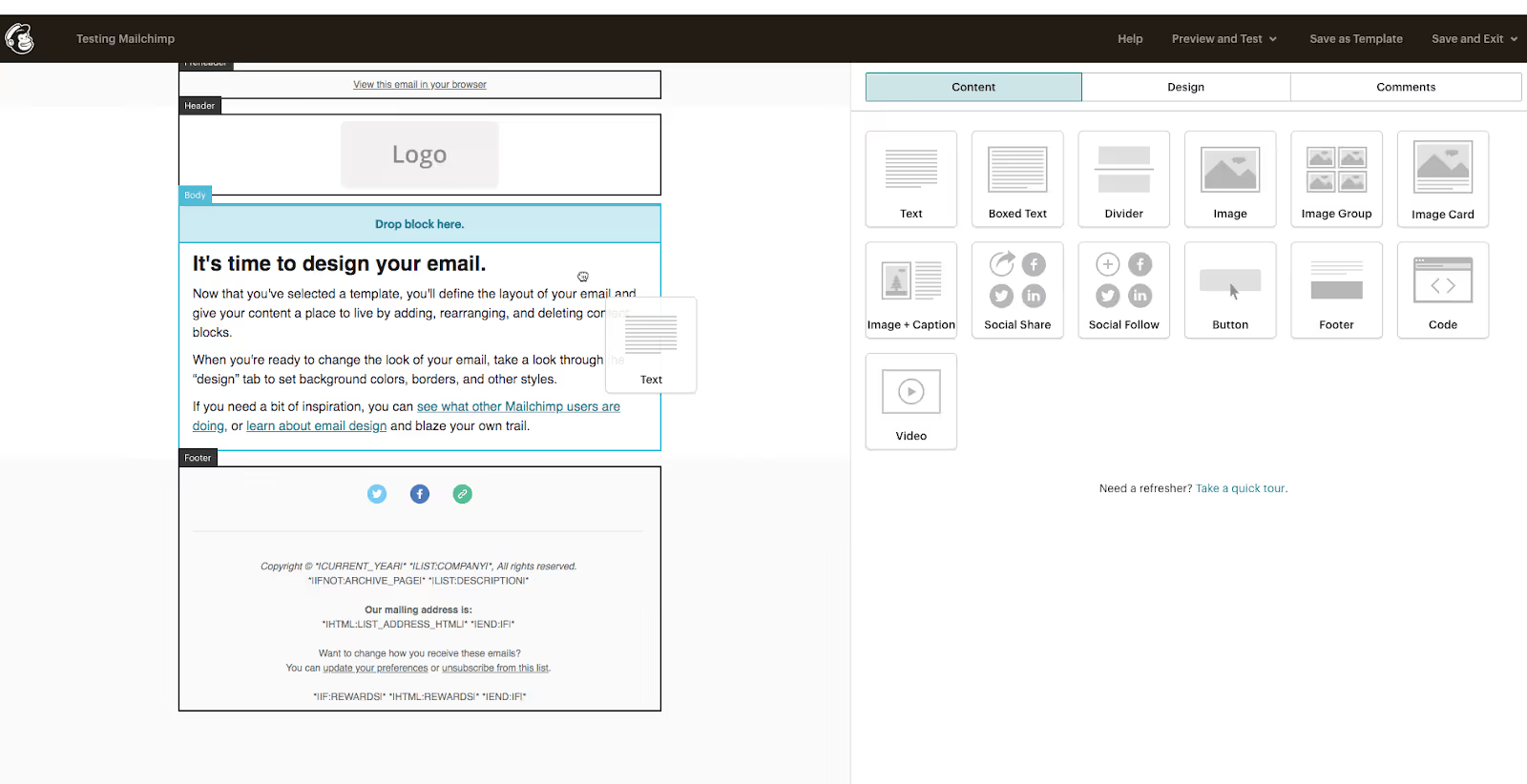
Mailchimp is the OG of B2C email marketing software, so it deserves our #3 spot.
For vendors without a lot of design experience or knowledge of advanced automation sequences, Mailchimp is a good place to learn the basics. It has prebuilt customer journeys and a simple drag-and-drop tool to build campaigns like welcome newsletters and cart abandonment. Mailchimp's transactional email feature is also super helpful if you want to automatically send order information to a customer once their purchase is complete.
The interesting thing about Mailchimp is some of its B2C features, like customer journeys and automation sequences, are so simple that every marketer can use them to create campaigns. Others, like transactional emails, are complex and require generating API keys or an SMTP integration.
If you want to go beyond Mailchimp's basics—it comes with a steep learning curve.
Pros
✔️ The forever free plan is open for your first 2000 subscribers—enough to learn the basics
✔️ Automated order confirmations and cross-sell tools to improve customer experience
Cons
❌Use the basic features or spend (a lot) of time learning the advanced ones—there's no in between
❌Despite the forever free plan, Mailchimp is really expensive for stores with bigger email lists
💰Pricing
If your email list is larger than Mailchimp's forever free plan allows (2000 subscribers), but it is restrictive. To unlock the features, you’ll need a paid plan which start at $11/month for 500 subscribers.
As your list grows, so does your bill. You need a premium plan to access the features that make Mailchimp worthwhile for B2C campaigns, like multivariate testing and audience segmentation. These start at nearly $300 a month. Oh, and those transactional emails we talked about? Yep, they're a paid add-on.
4. ActiveCampaign
TL;DR 👇
⚡ Best B2C integrations: Shopify, Unbounce, ChatBot, Drift, Big Cartel, Stripe, Square.
💰 Pricing: Paid plans start at $9/month.
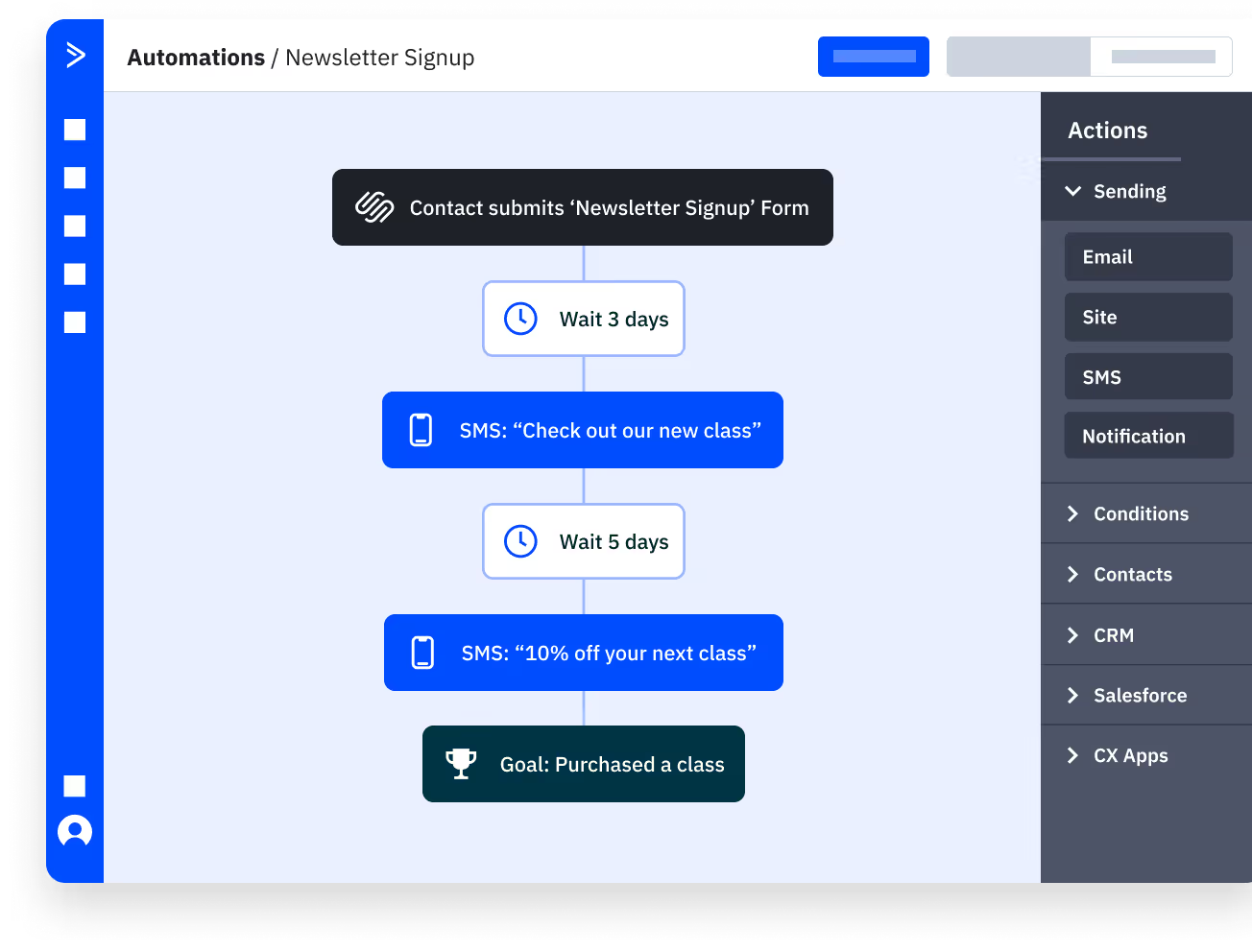
ActiveCampaign is built for B2C vendors that want a simple tech stack and prefer all-in-one tools.
With a basic CRM system, automated emails and lead-scoring tools, ActiveCampaign has enough features to get your first B2C email campaign up and running. Thanks to sales automation and inbuilt CRM, teams can track customers and store data to help personalize campaigns and target shoppers with products they like.
ActiveCampaign isn't specifically an eCommerce software—it's geared towards everyone from hospitality businesses to bloggers. But with features like email scheduling and multichannel marketing, vendors can still plug in social media channels and create retargeting campaigns like many other software on our list.
Pros
✔️An all-in-one platform that includes basic email automation, SMS and CRM
✔️Simple and easy to use (perfect if you're just starting out with B2C marketing!)
Cons
❌Some of the features are wasted on eCommerce vendors because they're so broad
❌There's a learning curve if you want to customize features like templates and sequences. Some coding and automation knowledge is necessary (steep learning curve alert 🚨)
💰Pricing
Test out ActiveCampaign for 14-days using their free trial. If it's a good fit, paid plans start at $9/month for your first 500 subscribers.
B2C companies will struggle with ActiveCampaign's cheapest plan. CRM, eCommerce integrations and landing pages aren't included. If you want them, you'll need the Plus Plan, which costs $49/month for 500 subscribers.
5. Omnisend
TL;DR 👇
⚡ Best B2C integrations: Facebook Lead Ads, Gorgias, AfterShip, Gatsby, Recharge.
💰 Pricing: Plans start at $16/month.
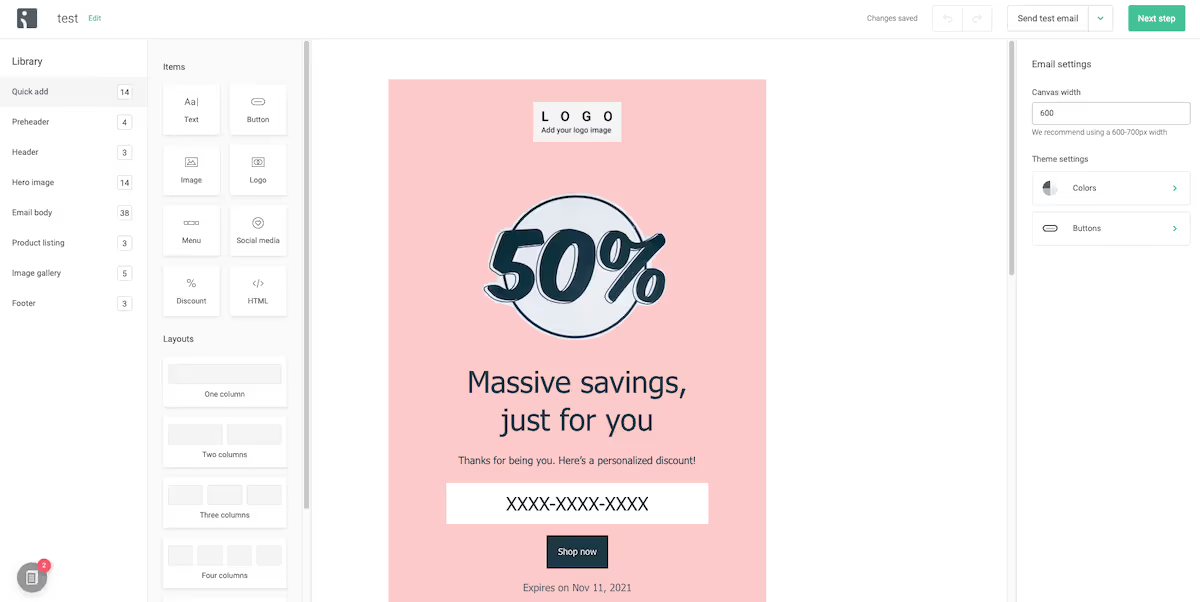
Next up on our list is Omnisend, a B2C marketing tool with automated, segmented email campaigns and push notifications.
Omnisend comes packed with B2C features like popups, landing pages and signup boxes to build an email list. Once subscribers are in your funnel, you can use the tool's template library to create email campaigns and automated sequences.
The software is also ideal for brands with an omnichannel marketing approach. You can use it to send customers messages over email and SMS, or plug in your Facebook and Google accounts to cover all advertising bases. Omnisend gives you access to all these channels under one roof.
Pros
✔️ It's simple to use and doesn't have a big learning curve like some of the other tools on our list
✔️ The free plan includes most of the tool's advanced features
Cons
❌No geo-location or social media tracking, which impacts retargeting for campaigns
❌There's no phone support (no matter what pricing tier you're on!)
💰Pricing
If you've only got a small list, take a look at Omnisend's free plan, which allows up to 250 contacts and 500 sends a month. For B2C vendors with a bigger list, the standard plan costs $16/month and includes 6,000 email sends and 60 SMS sends.
6. Campaign Monitor
TL;DR 👇
⚡ Best B2C integrations: Google Analytics, Branch, Lytics, Intercom, Campaign Monitor for WordPress.
💰 Pricing: Plans start at $9/month.
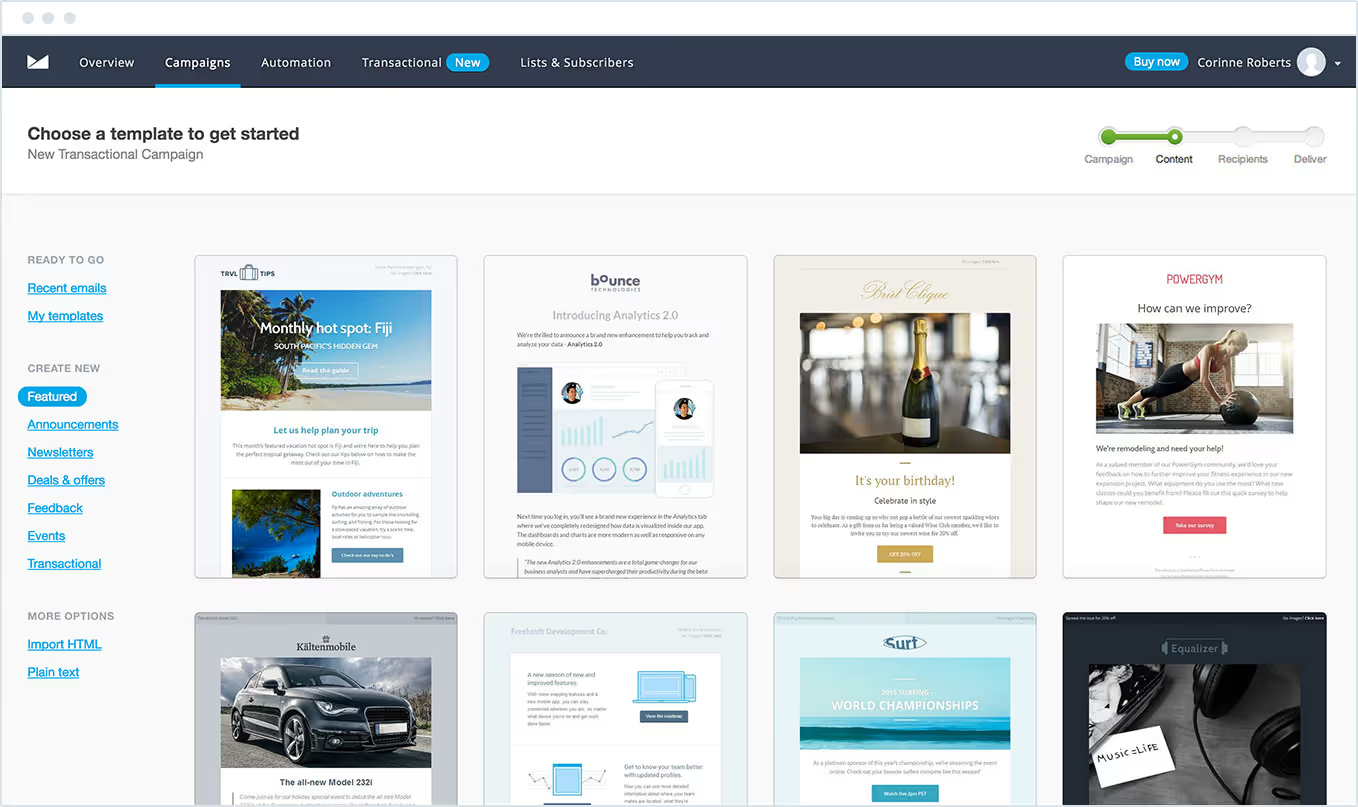
The last B2C email marketing tool on our list is Campaign Monitor, which is trusted by names like Digiday and Rip Curl.
It has all the good stuff marketers need to connect with customers like a drag-and-drop campaign builder, automated sequences and customizable templates. You can add behavioral triggers to a campaign and store and segment data for future campaigns.
Campaign Monitor also comes with a bunch of prebuilt autoresponder campaigns like welcome journeys and abandoned carts. All you have to do is plug in your own content and hit publish.
Pros
✔️ Templates are simple to use and don't take a coding genius to customize
✔️ Impressive data segmentations and analytics tools give you a good insight into your customers
Cons
❌Skeleton customer support with no phone or chat options
❌Split testing is limited to testing just two elements
💰Pricing
Campaign Monitor's free trial doesn't have a time limit, so you take a couple of weeks to figure out if you like its features. Paid plans start at $9/month and have limits (500 subscribers/2500 emails a month), and certain features like triggers aren't included. To unlock them, you'll need to upgrade to the Unlimited Plan, which starts at $29/month.
//[inject:ad-personalized-email]
What B2C Email Marketing Software will you choose?
Most B2C email marketing tools may look the same on the surface, but it pays to do a little digging before picking one to connect with customers.
Some, like ActiveCampaign, have a lot of basic features that can be used in multiple industries. Others, like Sendlane or Drip, have been specifically built for vendors who want to connect with customers using personalization and advanced targeting.
Sendlane’s B2C email marketing software has it all—an easy-to-use interface, prebuilt funnels and advanced features like multivariable segmentation, SMS and multichannel automation. For B2C marketers who want to go beyond bulk emails and connect with customers on a personal level, Sendlane is the perfect partner.
Claim your 60-day free trial of Sendlane here (no credit card required).




%20(1).avif)




%20(1).avif)
%20(1).png)
.avif)


.avif)
.avif)


.avif)





.avif)



.avif)





.avif)


.avif)

.avif)
.avif)

.avif)
.avif)

.avif)

.avif)


.avif)
.avif)
%20(1).avif)
.avif)









.avif)











.avif)
.avif)

%20(1).avif)

%20(1).avif)



.avif)


























.avif)











































.avif)



.avif)




























.avif)



.avif)

.avif)

.avif)
.avif)


.avif)













.avif)

.avif)










.avif)












.avif)






































.avif)



.avif)

.avif)

.avif)
.avif)

.avif)
.avif)

.avif)

.avif)

.avif)
























